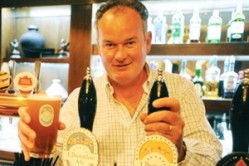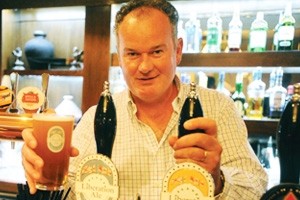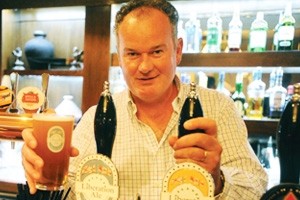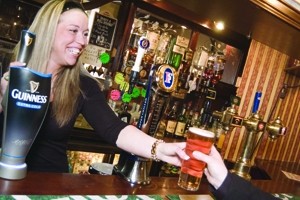The Big Interview: Mark Crowther, Liberation Group

But the espetada is a traditional dish here — an estimated 15% to 20% of the Jersey population are of Portuguese origin.
At the St Mary’s Country Inn, a large managed pub in the middle of the island and a show-house for the Liberation Group, espetadas are the theatrical centrepiece of a menu that would sit comfortably alongside the most progressive casual-dining experiences on the mainland.
This is worth mentioning because, in some ways, Channel Island pubs lag behind their counterparts on the mainland, as Liberation’s chief executive Mark Crowther will admit.
Crowther himself, though, is in a good position to take them into the 21st century. Liberation, with 69 pubs, is the largest operator on
the islands, and since forming the company out of local conglomerate SandpiperCI’s unwanted pubs and brewing business he’s recorded four years of consecutive growth, more than doubled beer volumes and taken turnover to a healthy £68m.
Crowther’s past career, including stints with Allied Domecq, Diageo, Carlsberg, Brakes and his own bar chain, the Front Room, prepared him perfectly for the job.
“I’d run everything from drinks businesses and young persons’ venues to tenancies. I knew all the different elements that go to make a regional brewery.”
When he was approached by LGV Capital to lead the buyout he’d just been prematurely dumped by pubco London Town, set up to turn around a bundle of neglected tenancies, but unexpectedly taken over after about three months. “That was not a good career move,” he says. “I wasn’t there long enough to know whether I’d done a good job or not.”
The deal that formed Liberation Group was tricky, requiring loans from HSBC and Allied Irish Bank just at the time when credit was being squeezed. Although it was this, Crowther believes, that deterred mainland brewers from making a move on the Channel Islands, leaving the field clear for himself.
He took a thorough approach to the job. “I visited all 65 pubs we had at the time, did business plans for each, calculated how much they could make and decided which should be tenanted and which managed.”
As a result 20 pubs switched from managed to tenancy, increasing the leased division to 50. Existing six-month rolling agreements were ditched in favour of modern commercial tenancies, mostly eight-year terms with some 20-year leases to give licensees the incentives they needed to grow the businesses.
“They are based on the latest thinking on tenancy agreements with all the flexibility that involves,” says Crowther.
The estate got some much-needed investment, too. “They were unloved pubs,” he says. “We’ve spent more than £3m on them in four years and seen some fantastic returns.” The classy refurb at St Mary’s is a good example. A £250,000 spend is seeing a 26% return on capital and has lifted takings to £18,000 a week.
The Horse & Hound at Red Houses, also on Jersey, is more of a traditional local, typical of the Channel Islands. The upgrade at the 600-barrel-a-year tenancy has retained the division between saloon and public bar, reflecting the strong beer-drinking culture on the islands.
“In some ways it’s like Great Britain 20 years ago,” explains Crowther. “We have a lot of pubs with big barrelages. And they still have public bars. That’s a positive for us, that we can keep a separate drinking area.
“Pubs are well-used here,” he goes on. “There’s a big blue-collar population in the habit of going to the pub. They see it as an extension of their lounge. Taxes are low, too, so there’s more disposable income to spend at the bar.”
Under the local licensing regime alcohol discounting is not allow-ed and there’s no duty escalator, although taxes tend to follow the
trend in Great Britain.
Despite or perhaps because of that, the Channel Islands beer market is relatively under-developed, until recently dominated by old-
fashioned keg beer, plus the occasional handpump, to cater for the two million tourists who visit during the course of a year.
That’s begun to change, too, thanks to Crowther’s most high-profile initiative, the launch of Liberation Ale in May 2009.
“When I came here there was no focus on the brewing business,” he says. “The market here is still quite traditional, real ale is still in its infancy. We were brewing just over 2,000 barrels a year and 90% of it was keg. Last year we brewed more than 5,000 barrels. Liberation Ale has been fantastic PR for us. It’s our London Pride.”
Locals as well as visitors have taken to the golden ale so well it accounts for half of all production at the brewery in St Helier. Some 650,000 pints are downed a year, well on the way to Crowther’s ambition to make it a million-pint brand.
“But there is a slight cloud on the economic horizon,” he adds, referring to HM Revenue & Customs’ closing of a tax loophole that enabled the Channel Islands to export low-value goods to the UK free of VAT.
“There are 1,700 jobs under threat and we’re waiting to see what the impact will be. But I see it as an encouragement for us to take on more local people.”
Liberation is already one of the biggest employers with 500 people on its books, and Crowther is keen to add to the four new pubs he’s already bought at a cost of £3.5m.
“There are acquisition opportunities here through individual sites, for managed and tenancy. We’ve only 10% of the on-licences on Jersey.”
He’ll also continue to upgrade the estate and introduce new products on the bar. While the brewery’s Mary Ann keg ales, which have been around for more than a century, still have a loyal following — and Crowther even dares hope they might have a part to play in the craft-beer revolution — “it’s world beers and cask ales that are driving footfall for us”.
And his ambitions extend beyond the shores of Jersey, Guernsey and Alderney. “We’ve grown every year for four years and we’re still growing. Part of that comes from what we’ve bought, and the rest from what we’ve done to the business. We have predictable cash flows, we’ve paid off our debt and we have financial backing.
“We can use that as a base to go onto the mainland, and perhaps acquire another business like this one that fits what we’re doing. I’d love to add something in the UK.”
Crowther’s career history has so far been eclectic, even restless, never sticking at one thing for too long. But perhaps this time it will be different. An unusually long commute, from the family home in Bath via Southampton airport, has not weakened his enthusiasm for the business, and the fickleness of venture capitalism doesn’t seem to bother him.
“It’s going really well. We’ve put the business on its own two feet, we’re winning awards. Why would we sell? At some point LGV Capital will want to exit, and it’s my job to see it does that successfully. But I own 15% of the business myself and I’m enjoying it. There are so many different facets.
“Someone like me doesn’t often get a chance to do something like this. Right now, I’m going nowhere.”
My kind of pub
“I like a good traditional pub serving a great pint of real ale with football on in the corner and a warm atmosphere. I also like to go for a long Sunday roast.
“I appreciate a good town-centre pub. I go to the Salamander in Bath, run by Bath Ales, when I’m at home.”
Key dates
1990
Mark Crowther graduates from the University of Wales with a degree in maritime studies and joins pubco Allied Domecq
1991
Becomes the company’s youngest area manager, taking responsibility for the Firkin brand and Irish pubs.
1996
Moves to Germany to manage the Ready to Roll restaurant chain for My Kinda Town
1997
General manager for Guinness/Diageo’s north European export markets
2001
Founds the Front Room bar chain, opening 12 outlets in west London
2002
CI Traders (later SandpiperCI) acquires Ann Street Brewery, relocates to St Helier and changes name to Jersey Brewery
2003
Crowther becomes managing director of Brakes foodservice’s fresh produce division
2006
Joins Carlsberg UK as on-trade sales director
2007
Appointed chief executive of London Town
2008
Leads acquisition of SandpiperCI’s hospitality and drinks division to found Liberation Brewery














